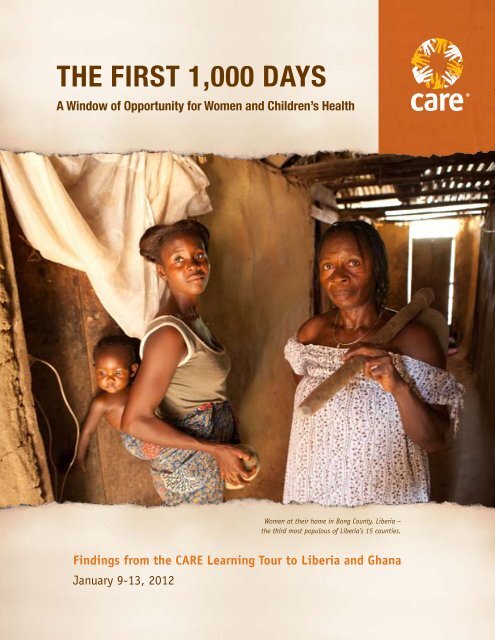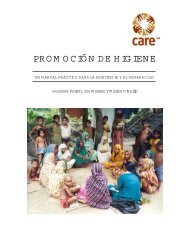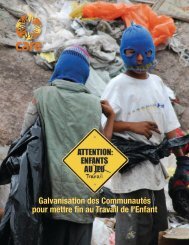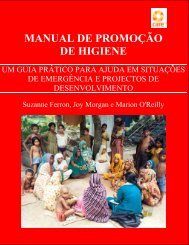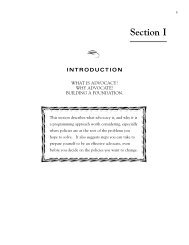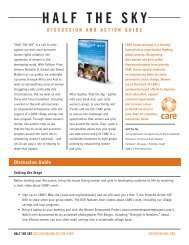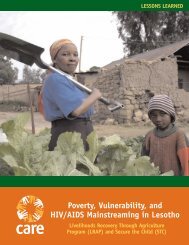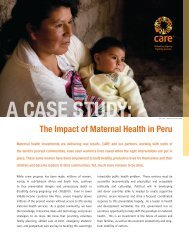The First 1000 Days, Liberia & Ghana (January - Care
The First 1000 Days, Liberia & Ghana (January - Care
The First 1000 Days, Liberia & Ghana (January - Care
- TAGS
- liberia
- ghana
- www.care.org
Create successful ePaper yourself
Turn your PDF publications into a flip-book with our unique Google optimized e-Paper software.
<strong>The</strong> FirsT 1,000 <strong>Days</strong><br />
a Window of Opportunity for Women and Children’s health<br />
Findings from the CARE Learning Tour to <strong>Liberia</strong> and <strong>Ghana</strong><br />
<strong>January</strong> 9-13, 2012<br />
Women at their home in Bong County, <strong>Liberia</strong> –<br />
the third most populous of <strong>Liberia</strong>’s 15 counties.<br />
Findings from the CARE Learning Tour to <strong>Liberia</strong> and <strong>Ghana</strong>, <strong>January</strong> 9-13, 2012 1
Introduction<br />
In <strong>January</strong> 2012, a high-level delegation, including U.S.<br />
Representatives Tom Marino (R-PA), Bobby Rush (D-IL)<br />
and Hank Johnson (D-GA), traveled to the countries of<br />
<strong>Liberia</strong> and <strong>Ghana</strong> on CARE’s Learning Tour to examine<br />
the effectiveness of U.S. Government investments in<br />
foreign assistance programs.<br />
Over the week, the delegation visited urban and rural<br />
sites in <strong>Liberia</strong> and <strong>Ghana</strong>, consulted with senior leaders<br />
and civil society groups, and interacted directly with<br />
community members and local leaders. Through observation<br />
and open dialogue, the delegation examined both<br />
the opportunities and challenges faced by governments<br />
and organizations working together to improve the health<br />
and well-being of women, children and communities.<br />
This Learning Tour encouraged participants to focus on<br />
the first one thousand days between a woman’s pregnancy<br />
and her child’s second birthday as a window of opportunity<br />
to shape healthier and more prosperous futures. <strong>The</strong><br />
right nutrition during this 1,000 day window can have<br />
a profound impact on a child’s ability to grow, learn,<br />
and rise out of poverty. It can also shape a society’s<br />
long-term health, stability and prosperity.<br />
<strong>The</strong> 1,000 <strong>Days</strong> partnership, a U.S. State Department<br />
initiative, brings together a wide-range of partners to<br />
help create lasting improvements in maternal and child<br />
nutrition. Non-Governmental Organizations (NGOs), donor<br />
and private sector partners working across a variety of<br />
sectors – including health, agriculture and food security,<br />
water, sanitation and hygiene, economic development<br />
and gender equality – each have an opportunity to work<br />
toward better nutrition outcomes in the 1,000 day window<br />
through their priorities, practices and programming.<br />
(www.thousanddays.org)<br />
Delegates also learned what a strong partner the United<br />
States is by examining how key U.S.-supported programs<br />
such as the Global Health Initiative and Feed the Future<br />
are working to foster innovation, integrate programs and<br />
collaborate with civil society organizations to improve<br />
overall health, education and economic opportunities,<br />
and encourage gender equity and women’s leadership in<br />
<strong>Liberia</strong> and <strong>Ghana</strong>.<br />
Participants<br />
• Congressman Hank Johnson (D-GA-4)<br />
• Congressman Tom Marino (R-PA-10)<br />
• Congressman Bobby Rush (D-IL-1)<br />
• Chloe Marino<br />
Daughter, Congressman Marino<br />
• Jonathan Ossoff<br />
Senior Legislative Assistant, Congressman Johnson<br />
• Carolyn Rush<br />
Wife, Congressman Rush<br />
• Susan Mars<br />
Mars Family Foundation<br />
• Dr. Afaf Meleis<br />
CARE Board Member & Dean of Nursing, University of<br />
Pennsylvania<br />
• JoDee Winterhof<br />
Senior Advocacy Advisor, CARE<br />
<strong>The</strong> delegation with U.S. Ambassador to <strong>Ghana</strong>, Donald Teitelbaum,<br />
from left to right: Jonathan Ossoff, Giulia McPherson, Carolyn Rush,<br />
Congressman Bobby Rush, Chloe Marino, Congressman Tom Marino,<br />
Congressman Hank Johnson, Dr. Afaf Meleis, JoDee Winterhof,<br />
Saiqa Panjsheri and Bethann Cottrell.<br />
2 Findings from the CARE Learning Tour to <strong>Liberia</strong> and <strong>Ghana</strong>, <strong>January</strong> 9-13, 2012
Two-Country Learning Tour:<br />
Witnessing the Contrast<br />
<strong>Liberia</strong> and <strong>Ghana</strong> are intimately connected through<br />
history and geography, with an abundance of natural<br />
resources, including a wide variety of crops, minerals,<br />
oil and gas deposits. Both countries also have strong<br />
ties to the United States as a partner for sustainable<br />
development and economic growth.<br />
<strong>Liberia</strong>, under the leadership of Africa’s first and only<br />
female head of state, President Ellen Johnson Sirleaf,<br />
is working toward lasting peace and security after 14<br />
years of civil war. It is on the threshold of transformation.<br />
Efforts are underway to address poverty reduction,<br />
foster economic opportunity and create a more<br />
accountable government. <strong>Liberia</strong> has made progress on<br />
the Millennium Development Goals (MDGs), but has a<br />
long way to go before achieving lasting improvements<br />
in poverty, health and education.<br />
<strong>Ghana</strong>, on the other hand, has made impressive strides<br />
toward reaching several MDG targets by 2015, most significantly<br />
MDG 1 (halving extreme poverty and hunger<br />
by 2015). Also, according to the World Bank, <strong>Ghana</strong><br />
ranks as one of the 17 strongest emerging African countries.<br />
Dramatic changes in poverty reduction, economic<br />
development and political stability designate <strong>Ghana</strong> as<br />
a model of sustainable growth in the region.<br />
While progress has been made on MDGs 4 and 5, focused<br />
on improving children and women’s health, <strong>Liberia</strong><br />
and <strong>Ghana</strong> continue to suffer from unacceptably high<br />
rates of malnutrition, particularly for pregnant mothers<br />
and children under the age of two - leading to chronic<br />
health problems. Despite the capacity of the region to<br />
produce highly nutritious food, both countries remain<br />
food insecure and lack proper diversity in their diets.<br />
<strong>Liberia</strong> Overview<br />
<strong>Liberia</strong> occupies 43,000 square miles of the West African<br />
coastline and is slightly larger than the U.S. state of<br />
Ohio. Its humid and low-lying coastal plain is intersected<br />
by numerous marshes and its capital Monrovia<br />
12° 11°<br />
<strong>The</strong> boundaries and names shown and the designations used<br />
on this map do not imply official endorsement or acceptance<br />
by the United Nations.<br />
10°<br />
Guéckédou<br />
9° 8° 7°<br />
Mendekoma<br />
Voinjama<br />
Kolahun<br />
SIERRA LEONE Kailahun Buedu<br />
Mt.<br />
Pendembu<br />
Wuteve<br />
Vahun<br />
8°<br />
Zigida<br />
Irié<br />
GUINEA<br />
LIBERIA<br />
8°<br />
Kenema<br />
Gelahun<br />
LOFA<br />
Yella<br />
Zorzor<br />
Nzérékoré<br />
Mt. Gletohn<br />
Yekepa<br />
Mt.<br />
Nuon-Fa<br />
Kongo<br />
Wiesua<br />
Belle Yella<br />
Sanniquellie<br />
Danané<br />
7°<br />
6°<br />
Gbange<br />
Belefuanai<br />
Gahnpa<br />
Kahnple<br />
Bendaja GBARPOLU<br />
(Ganta)<br />
Sulima<br />
GRAND Bopolu<br />
Gbarnga Palala Kpein Sagleipie<br />
Bo CAPE<br />
Suakoko<br />
MOUNT Zienzu BONG Yela NIMBA Butlo<br />
Bong Town<br />
Robertsport Lake<br />
Piso BOMI<br />
Klay<br />
Zekera Kpeaple Toulépleu<br />
MARGIBI<br />
Guiglo<br />
Tapeta<br />
<strong>Care</strong>ysburg<br />
Brewerville<br />
Gboyi<br />
GRAND<br />
Tobli<br />
Kola (Kola Town)<br />
Monrovia<br />
Harbel<br />
BASSA Guata<br />
MONTSERRADO<br />
Marshall<br />
Poabli Towabli<br />
(Towai Town)<br />
Hartford<br />
Debli<br />
Tchien<br />
RIVER CESS<br />
(Zwedru)<br />
Edina<br />
Babu<br />
Taï<br />
Trade<br />
Ghapo<br />
Drubo<br />
Buchanan Town<br />
GRAND GEDEH<br />
(Dubwe)<br />
LIBERIA<br />
CÔTE<br />
Gonglee<br />
Duabo<br />
Galio<br />
D'IVOIRE<br />
International boundary<br />
Timbo<br />
Pelokehn<br />
Bokoa<br />
County boundary<br />
River Cess<br />
Shabli<br />
National capital<br />
Yakakahn Yibuke<br />
Juazohn<br />
(Kaobli)<br />
County capital<br />
RIVER GEE<br />
Kopo SINOE<br />
Town, village<br />
Tiehnpo Fish Town<br />
Sehnkwehn<br />
7°<br />
6°<br />
5°<br />
Road<br />
Railroad<br />
Airport<br />
0 20 40 60 80 km<br />
0 10 20 30 40 50 mi<br />
ATLANTIC<br />
OCEAN<br />
Tatuke<br />
Sinoe<br />
Greenville<br />
Bay<br />
GRAND<br />
Nana Kru<br />
KRU<br />
Barclayville<br />
Sasstown<br />
Grand Cess<br />
Tawake<br />
Kodeke<br />
Nyaake<br />
Nemeke<br />
Plibo<br />
5°<br />
Tabou<br />
C. Palmas<br />
12° 11° 10° 9° 8°<br />
Harper<br />
7°<br />
Map No. 3775 Rev. 7 UNITED NATIONS<br />
Department of Peacekeeping Operatons<br />
October 2010<br />
Cartographic Section<br />
receives an average rainfall of 177 inches per year.<br />
Inland <strong>Liberia</strong> is a densely forested plateau inhabiting<br />
40 percent of West Africa’s rainforest.<br />
Following more than two decades of political instability,<br />
including 14 years of civil war that cost the lives<br />
of more than 200,000 people, <strong>Liberia</strong>’s economy, social<br />
services and infrastructure were left in a state of devastation.<br />
<strong>The</strong> war, which ended in 2003, destroyed most of<br />
<strong>Liberia</strong>’s basic infrastructure and has prevented farmers<br />
from having a reliable crop system.<br />
<strong>Liberia</strong> now lies near the bottom of the Human Development<br />
Index – ranking 176 out of 179 nations (compared<br />
to <strong>Ghana</strong>’s ranking of 137). Eighty-four percent of the<br />
population lives on less than $1.25/day (the internationally<br />
recognized threshold of extreme poverty), the<br />
unemployment rate is over 80 percent, only 25 percent<br />
of the population has access to safe drinking water and<br />
the maternal mortality rate is one of the highest in the<br />
world (994 out of 100,000 women).<br />
During the Learning Tour, the country was preparing to<br />
inaugurate President Ellen Johnson Sirleaf for a second<br />
term in office. In 2005, President Sirleaf became Africa’s<br />
first democratically elected female president after the<br />
country held the most free, fair and peaceful elections<br />
in its history.<br />
Findings from the CARE Learning Tour to <strong>Liberia</strong> and <strong>Ghana</strong>, <strong>January</strong> 9-13, 2012 3<br />
Moa<br />
Morro<br />
Makona<br />
Magowi<br />
Gbeya<br />
Tubmanburg<br />
Loffa<br />
Kakata<br />
Wologizi Range<br />
Lawa<br />
Wonegizi Range<br />
Mano Via<br />
St. Paul<br />
Timbo<br />
Loffa<br />
Nianda<br />
St. John<br />
Cess (Cestos)<br />
Gwen Creek<br />
Sehnkwehn<br />
Sino<br />
Mani<br />
Nimba Range<br />
Dugbe<br />
Nuon<br />
Cavally<br />
Cavally<br />
Putu Range<br />
Dubo<br />
Grand Cess<br />
Dube<br />
MARYLAND<br />
Cavalla<br />
Sassandra
“We have suffered years of deprivation<br />
and terror, during which democratic<br />
principles were exiled from our shores.<br />
We have looked into the vacant eyes of<br />
a generation of young <strong>Liberia</strong>ns whose<br />
hope for the future was stolen. We all,<br />
together, will never allow those mistakes<br />
to be repeated. We will never again shed<br />
the mantle of democracy, of freedom, of<br />
national unity, of patriotism.”<br />
– Ellen Johnson Sirleaf, inaugural address,<br />
<strong>January</strong> 16, 2012<br />
Despite rich natural resources and potential for selfsufficiency<br />
in food production, <strong>Liberia</strong>’s economy remains<br />
less competitive because of a devastated infrastructure,<br />
lack of a skilled labor force, low literacy rate and poor<br />
health indicators. Support from international donors like<br />
the U.S. Agency for International Development (USAID)<br />
currently focuses on a post-conflict rebuilding strategy<br />
including infrastructure projects, strengthening<br />
civil society’s role in delivering services and good<br />
governance, as well as providing basic education and<br />
health programs.<br />
<strong>Liberia</strong> is moving toward longer-term development<br />
programs including rehabilitating rural infrastructure,<br />
improving food security, strengthening local capacity<br />
and improving basic health and education services, and<br />
expanding economic opportunities.<br />
<strong>Ghana</strong> Overview<br />
<strong>Ghana</strong>’s population of 24 million makes it one of the most<br />
densely populated countries in West Africa. It covers<br />
92,000 square miles – about the size of U.S. states Illinois<br />
and Indiana combined – and is one of the continent’s most<br />
stable and promising democracies.<br />
Life expectancy is currently at 64 years, the highest<br />
in sub-Saharan Africa, and over the past 20 years<br />
the country has seen a 20 percent drop in the child<br />
mortality rate, as well as significant growth in primary<br />
education enrollment.<br />
<strong>Ghana</strong> was recognized for its economic and democratic<br />
achievements in 2006 when it signed a 5-year,<br />
$547 million anti-poverty compact with the U.S. Millennium<br />
Challenge Corporation (MCC), which is now<br />
in the final stages of implementation. <strong>The</strong> compact<br />
focused on accelerating growth and poverty reduction<br />
through agricultural and rural development, including<br />
supporting smallholder farmers, rehabilitating roads<br />
and improving living conditions in rural communities<br />
(building schools, providing electricity and establishing<br />
facilities for water and sanitation). During this trip,<br />
the Learning Tour delegation learned that <strong>Ghana</strong> is in<br />
the process of developing a proposal for a second compact<br />
from the MCC.<br />
GHANA<br />
2° 1° 0°<br />
B U R K I N A F A S O Bitou<br />
Léo<br />
Pô<br />
1°<br />
11°<br />
Diébougou<br />
Hamale<br />
Lawra<br />
Tumu<br />
Bawku<br />
Navrongo<br />
Zebila<br />
U P P E R E A S T<br />
Bolgatanga<br />
Dapaong<br />
GHANA<br />
Nakpanduri<br />
Gaoua<br />
U P P E R W E S T<br />
Wa<br />
Gambaga<br />
Wulugu<br />
Wawjawga<br />
Mango BENIN<br />
10°<br />
Batié<br />
Gushiago<br />
10°<br />
Guérin<br />
Varalé<br />
Kouka<br />
Djougou<br />
N O R T H E R N<br />
Kara<br />
9°<br />
Bouna<br />
Sawla<br />
Gbenshe<br />
Bole<br />
Daboya Tamale<br />
Japei<br />
Damango<br />
Yendi<br />
Zabzugu<br />
Bimbila<br />
Bafilo<br />
Bassar<br />
Sokodé<br />
9°<br />
While <strong>Ghana</strong> has made tremendous strides, it still faces<br />
challenges in improving the lives of 20 percent of the<br />
population, predominantly in the northern regions that<br />
still lives on $1.25 a day. <strong>The</strong> entire country struggles<br />
with pervasive gender inequality as well.<br />
Although health services in <strong>Ghana</strong> have improved in<br />
recent decades, many health challenges still remain.<br />
Malaria is a major cause of morbidity and mortality<br />
4 Findings from the CARE Learning Tour to <strong>Liberia</strong> and <strong>Ghana</strong>, <strong>January</strong> 9-13, 2012<br />
Komoé<br />
Komoé<br />
Bougouriba<br />
Ba<br />
Bia<br />
Black Volta<br />
Tano<br />
Tain<br />
Ankobra<br />
Kolpawn<br />
Black Volta<br />
Sisili<br />
Pra<br />
White Volta<br />
Anum<br />
Pru<br />
Volta Rouge<br />
Koutouba<br />
Bondoukou<br />
Bamboi<br />
Kintampo<br />
Sampa<br />
Wenchi<br />
Techiman<br />
Atebubu<br />
Agnibilekrou<br />
Bechem<br />
Ejura<br />
Abengourou<br />
Goaso<br />
Mampong<br />
Konongo<br />
Adriemba Nkawkaw<br />
Bibiani Bekwai<br />
Wiawso<br />
Obuasi<br />
Kade<br />
Dunkwa Oda<br />
Enchi<br />
Asankrangwa<br />
Nsawam<br />
Foso<br />
Shai<br />
Bawdia<br />
Hills<br />
Bogoso<br />
Twifu Praso Swedru<br />
Teshi<br />
Prestea<br />
Esiama<br />
Axim<br />
Tarkwa<br />
Winneba<br />
Saltpond<br />
Tema<br />
CÔTE D'IVOIRE<br />
Salaga<br />
T O G O<br />
Blitta<br />
8°<br />
Yeji<br />
B R O N G - A H A F O Kwadjokrom<br />
Berekum<br />
Dumbai<br />
Kete Krachi<br />
VOLTA<br />
Kadjebi<br />
Badou<br />
Elavagnon 8°<br />
Atakpamé<br />
Jasikan<br />
Sunyani<br />
Lake<br />
Apéyémé<br />
Hohoe<br />
7°<br />
A S H A N T I Agogo<br />
Kumasi<br />
Volta<br />
EASTERN<br />
Kpandu<br />
Kpalimé<br />
Ho<br />
Notsé 7°<br />
6°<br />
Aboisso<br />
L. Bosumtwi<br />
Anyirawasi<br />
Tsévié<br />
Begoro<br />
Awaso<br />
Akosombo<br />
Dzodze<br />
Dam<br />
Aflao Aného<br />
Koforidua<br />
Sogakofe Lomé<br />
W E S T E R N<br />
6°<br />
Keta Lagoon<br />
Keta<br />
GREATER<br />
ACCRA Ada Anloga1°<br />
National capital<br />
C E N T R A L Accra<br />
Regional capital<br />
Lagune<br />
Aby<br />
Newtown<br />
5°<br />
Half Assini<br />
Elmina<br />
Gulf of G uinea<br />
Cape Coast<br />
5°<br />
Sekondi-Takoradi<br />
Town, village<br />
Airport<br />
International boundary<br />
Regional boundary<br />
Main road<br />
0<br />
0<br />
25 50 75 100 km<br />
25 3°<br />
50 75 mi<br />
Cape Three<br />
Points<br />
2°<br />
<strong>The</strong> boundaries and names shown and the designations<br />
used on this map do not imply official endorsement or<br />
acceptance by the United Nations.<br />
1° 0°<br />
Secondary road<br />
Railroad<br />
Map No. 4186 Rev. 3 UNITED NATIONS<br />
Department of Peacekeeping Operations<br />
February 2005<br />
Cartographic Section<br />
Afram<br />
Birim<br />
D aka<br />
Asamankese<br />
Oti<br />
Volta<br />
Oti<br />
Anie<br />
Sio<br />
Mono<br />
Amou
– contributing to low productivity and reduced school<br />
attendance. In addition, unsafe drinking water,<br />
inadequate sanitation and poor hygiene are major<br />
causes of diarrhea among children under five – posing<br />
a significant problem throughout the country in both<br />
urban and rural communities.<br />
<strong>Ghana</strong>’s current development goals are focused on<br />
accelerating economic growth, improving the quality<br />
of life of <strong>Ghana</strong>ians and reducing poverty through<br />
macroeconomic stability, higher private investment,<br />
broad-based social and rural development, as well as<br />
direct poverty-alleviation efforts.<br />
Day One: Setting the Stage in <strong>Liberia</strong><br />
<strong>The</strong> Learning Tour delegation began its visit to <strong>Liberia</strong><br />
with an informative briefing, with various stakeholders<br />
representing the <strong>Liberia</strong>n government and international<br />
community. This group included Hubert Charles, Country<br />
Director, CARE <strong>Liberia</strong>; Dr. Walter Gwenigale, <strong>Liberia</strong>n<br />
Minister of Health and Social Welfare; Dr. Talak Hussain,<br />
Health Specialist, UNICEF; and Michael Boyd, Economic<br />
Growth Officer, USAID. Each of the speakers shared recent<br />
progress and challenges in <strong>Liberia</strong>’s growth, specifically<br />
in terms of maternal and child nutrition in the years after<br />
the conflict.<br />
Hubert Charles provided an overview of CARE’s work<br />
throughout the country. He noted that <strong>Liberia</strong> has made<br />
significant progress since the war, but that it is important<br />
to sustain these gains. Through agriculture conservation<br />
programs, CARE has introduced conservation<br />
techniques to smallholder farmers, increased access to<br />
land (especially for women) and helped empower women<br />
to play a greater leadership role in their communities.<br />
CARE <strong>Liberia</strong> has also established 100 Village Savings<br />
and Loan Associations (VSLAs) which have generated<br />
over $100,000 in savings over two years. <strong>The</strong>se groups,<br />
comprised mostly of women, have helped individuals<br />
and families generate incomes through small businesses,<br />
which primarily pay for education and health<br />
care costs.<br />
Dr. Afaf Meleis talks with the delegation and national officials<br />
at the scene-setter breakfast on the first day in <strong>Liberia</strong>.<br />
<strong>The</strong> <strong>Liberia</strong>n Minister of Health and Social Welfare, Dr.<br />
Gwenigale, spoke about the state of <strong>Liberia</strong> after the<br />
war when infrastructure was destroyed and the entire<br />
government budget was a mere $80 million. With a lack<br />
of skilled health workers, their strategy was to focus on<br />
simple interventions to address infant mortality, including<br />
providing vaccinations, promoting breastfeeding<br />
and addressing the issue of malaria among children.<br />
Dr. Gwenigale also presented a frank picture of the lack<br />
of capacity within the Ministry of Health and Social<br />
Welfare and the challenges they face to manage programs<br />
and budgets. He emphasized the important role<br />
of the donor community by stating,<br />
“We depend on you and we are very<br />
grateful for the help you are giving us<br />
through your office of development.”<br />
– Dr. Gwenigale, <strong>Liberia</strong>n Minister of Health and Social<br />
Welfare<br />
Congressman Tom Marino poses with community<br />
members in <strong>Liberia</strong>.<br />
Findings from the CARE Learning Tour to <strong>Liberia</strong> and <strong>Ghana</strong>, <strong>January</strong> 9-13, 2012 5
UNICEF, as presented by Dr. Hussain, is working with<br />
the Ministry of Health and Social Welfare to implement<br />
a nutrition program as well as an integrated measles<br />
campaign focused on children.<br />
Michael Boyd of USAID noted that food security and<br />
nutrition are intimately linked, and as a result, USAID<br />
has designated <strong>Liberia</strong> as a Feed the Future initiative<br />
country. This Obama Administration program will help<br />
address malnutrition while developing markets – noting<br />
that Feed the Future is integrated with both economic<br />
and health programs.<br />
<strong>The</strong> delegation’s first site visit was to a Farmer’s Resource<br />
Center, which empowers women, including many who are<br />
widows from the war, and men to grow crops that nourish<br />
their families, sustain the rainy season and generate<br />
additional income for their families. <strong>The</strong> program,<br />
coordinated in partnership with ZOA International, also<br />
includes training on entrepreneurship, marketing and<br />
bookkeeping skills.<br />
Jimama Gbarnja, a CARE VSLA participant, discusses the impact<br />
of VSLA programs on her community.<br />
<strong>The</strong> second site visit was a VSLA which CARE coordi-<br />
nates on the outskirts of Monrovia in an area called<br />
“Peace Island.” <strong>The</strong> residents of this community are<br />
Congressman Rush with 2011 Nobel Laureate, Leymah Gbowee.<br />
primarily individuals displaced by the war, including<br />
former combatants. Since CARE first introduced VSLAs<br />
to this community in 2010, over 72 groups have been<br />
formed, comprised of 1,700 participants. Over 80 percent<br />
of the participants are women and the groups have<br />
generated $60,000 USD in loans. One woman, Jimama<br />
Gbarnja, joined the VSLA in 2010 and has taken out<br />
three loans. <strong>The</strong> first one was to pay for her children’s<br />
school fees, the second was to construct her home, and<br />
the third was to start a business selling coal, which is<br />
used for fuel. She said, “<strong>The</strong> savings group allowed me to<br />
put my children in school and taught me how to save my<br />
own money, accept a loan and then pay it back.”<br />
<strong>The</strong> delegation concluded its first day by taking part in<br />
a private meeting with 2011 Nobel Laureate, Leymah<br />
Gbowee. Ms. Gbowee was awarded the 2011 Nobel<br />
Peace Prize, alongside <strong>Liberia</strong>’s President Ellen Johnson<br />
Sirleaf and Tawakkol Karman of Yemen. Ms. Gbowee<br />
launched a peace movement led by women, which<br />
helped end <strong>Liberia</strong>’s civil war. She continues to work<br />
on behalf of human rights in her country as coordinator<br />
of <strong>Liberia</strong>’s National Reconciliation Initiative and<br />
noted during her remarks that, “as leaders, we must<br />
reignite the culture of hope to address the challenges<br />
that still face our country and its people.”<br />
6 Findings from the CARE Learning Tour to <strong>Liberia</strong> and <strong>Ghana</strong>, <strong>January</strong> 9-13, 2012
Day Two: Understanding Maternal,<br />
Newborn, and Child Health and Nutrition<br />
In the aftermath of the 14 year civil war in <strong>Liberia</strong>,<br />
which ended in 2003, 90 percent of communities in<br />
<strong>Liberia</strong> did not have a functioning health facility and<br />
95 percent of the country’s health facilities were damaged<br />
or destroyed. To achieve long-term stability and<br />
growth, the country’s leadership recognizes that investment<br />
in its health infrastructure is critical.<br />
Chloe Marino holds a baby at the health clinic in<br />
Bong County, <strong>Liberia</strong>.<br />
One of the areas of greatest need is maternal, newborn<br />
and child health. Today, <strong>Liberia</strong> has one of the world’s<br />
highest maternal mortality rates: 994 women out of<br />
every 100,000 die during pregnancy or delivery. This<br />
is compared to 24 out of every 100,000 in the United<br />
States. Only 28 percent of the population is immunized<br />
and malaria and diarrhea are among the major causes of<br />
death among children under five. High rates of malnutrition<br />
further exacerbate these persistently high rates<br />
of mortality and morbidity.<br />
In 2007, <strong>Liberia</strong> developed a National Health Plan which<br />
established policies to address these issues and set<br />
forth goals to strengthen the health sector. On the<br />
second day, the Learning Tour delegation visited a community<br />
health clinic in the town of Zeansue, established<br />
by Save the Children in partnership with the <strong>Liberia</strong>n<br />
Ministry of Health and Social Welfare, which is reaching<br />
a population that had no access to basic medical care.<br />
<strong>The</strong> clinic trains traditional midwives to become skilled<br />
birth attendants, including Polan Raerae, a 52-yearold<br />
member of the community, whose home now also<br />
serves as a “birth waiting home.” Polan helps identify<br />
pregnant women in the community, ensures that they<br />
receive prenatal care and provides them a place to go<br />
when they are preparing for labor and delivery. <strong>The</strong><br />
clinic also provides immunizations for children and<br />
adults, stocks a pharmacy with medical supplies and<br />
hosts a children’s club.<br />
In this particular county, maternal deaths have dropped<br />
from 13 out of every 1,000 women in 2010 to seven out<br />
of every 1,000 women in 2011. Community members are<br />
learning about nutrition, breastfeeding and family planning,<br />
and are equipped with this critical information as<br />
they prepare to welcome the newest member of their<br />
families.<br />
Inherent in the conversations regarding access to<br />
health and education are the basic principles surrounding<br />
human rights and accountable governance. <strong>The</strong><br />
delegation was able to witness and hear directly from<br />
community members in rural Suakoko who are learning<br />
to exercise those rights with the partnership of the<br />
Carter Center’s Access to Justice Project.<br />
<strong>The</strong> delegation observes a youth role play with traditional<br />
leaders in <strong>Liberia</strong>.<br />
Findings from the CARE Learning Tour to <strong>Liberia</strong> and <strong>Ghana</strong>, <strong>January</strong> 9-13, 2012 7
Since 2006, the Carter Center has worked to raise<br />
awareness about justice and the rule of law in rural<br />
communities by using drama, community forums,<br />
radio programming and music. In partnership with the<br />
Ministry of Justice and traditional leaders, they train<br />
community members (mainly youth) to use these techniques<br />
to share information about new and existing<br />
laws that address issues of inheritance, rape, domestic<br />
violence, land disputes and more. In an area with little<br />
access to a formal judicial system, this approach has<br />
been extremely successful.<br />
Day Three: <strong>The</strong> Importance of Governance<br />
<strong>The</strong> Learning Tour delegation had the honor of meeting<br />
President Ellen Johnson Sirleaf to discuss plans for her<br />
second term in office; the challenges her administration<br />
is currently tackling and how the U.S. can continue to<br />
be engaged in efforts to bring stability and prosperity<br />
to the country. “<strong>The</strong> United States is <strong>Liberia</strong>’s most<br />
important partner, and bilateral cooperation is strong,”<br />
said President Johnson Sirleaf. “I thank this delegation<br />
for visiting and commend CARE for restarting their critical<br />
work in <strong>Liberia</strong>.”<br />
By many accounts, including the Carter Center, presidential<br />
and legislative elections in <strong>Liberia</strong> were declared<br />
<strong>The</strong> delegation with <strong>Liberia</strong>n President, Ellen Johnson<br />
Sirleaf, from left to right: JoDee Winterhof, Carolyn Rush,<br />
Congressman Bobby Rush, Congressman Tom Marino, Dr.<br />
Afaf Meleis, Congressman Hank Johnson, Susan Mars, Jonathan<br />
Ossoff, Saiqa Panjsheri, Chloe Marino and an official<br />
from the foreign ministry.<br />
Congressman Hank Johnson and Bobby Rush are briefed<br />
by Kevin George and Kpadeson Sumo from the American<br />
Bar Association.<br />
free, fair and transparent and signified important<br />
progress towards the country’s broader goals of peace<br />
and stability. <strong>The</strong> Government of <strong>Liberia</strong> is working to<br />
restore public confidence in political, social, economic,<br />
and judicial institutions, while addressing the regional<br />
disparity and poor governance that contributed to its<br />
many years of conflict.<br />
<strong>The</strong> delegation learned more about <strong>Liberia</strong>’s civil and<br />
judicial system during a special lunch with Kevin<br />
George, the American Bar Association’s (ABA) Country<br />
Director in <strong>Liberia</strong> and his <strong>Liberia</strong>n colleague, Kpadeson<br />
Sumo. <strong>The</strong> ABA’s Rule of Law initiative began its <strong>Liberia</strong><br />
operations in <strong>January</strong> of 2006 and is committed to promoting<br />
access to justice in <strong>Liberia</strong>.<br />
<strong>The</strong> ABA plays a critical role in promoting legal education<br />
throughout <strong>Liberia</strong>. In partnership with <strong>Liberia</strong>’s only law<br />
school, the Louis Arthur Grimes School of Law at the University<br />
of <strong>Liberia</strong>, they are promoting legal education by<br />
ensuring that lawyers and citizens alike have access to<br />
the law code, providing training for judges, magistrates<br />
and court staff and has worked to improve prison conditions,<br />
inmate welfare and access to justice.<br />
8 Findings from the CARE Learning Tour to <strong>Liberia</strong> and <strong>Ghana</strong>, <strong>January</strong> 9-13, 2012
<strong>The</strong>se efforts are critical to ensuring that the citizens of<br />
<strong>Liberia</strong> feel confident in their legal and judicial systems<br />
– the cornerstone of any free and prosperous nation.<br />
Before leaving <strong>Liberia</strong>, the Learning Tour delegation visited<br />
a government hospital to see firsthand the impact<br />
that governance has on public institutions. Redemption<br />
Hospital in New Kru Town, adistrict of Monrovia, serves<br />
a population of 300,000 people and has maternity,<br />
pediatric, medical, surgical and emergency wards. <strong>The</strong>y<br />
see 900 patients daily and perform over 300 deliveries<br />
every month.<br />
Redemption Hospital is unique in that it provides a<br />
supplemental feeding program for infants suffering from<br />
malnutrition. <strong>The</strong> delegation was able to spend time with<br />
the doctors, nurses, patients and their mothers, who are<br />
part of this program. Children who are malnourished are<br />
treated in the hospital and then take part in an outpatient<br />
therapeutic program to monitor their progress.<br />
JoDee Winterhof is briefed by Dr. Sankor at<br />
Redemption Hosptial.<br />
<strong>The</strong> delegation saw firsthand how Redemption Hospital’s<br />
staff is working to save newborns and young children<br />
suffering from malnutrition and infectious diseases.<br />
Sadly, a young infant passed away from severe malnutrition<br />
while the delegation was touring the hospital.<br />
<strong>The</strong> delegation spoke with the hospital staff about the<br />
underlying causes including poverty, which prevents<br />
mostly poor, rural families from seeking adequate health<br />
care for their families. <strong>The</strong> visit further highlighted the<br />
need for education of and access to lifesaving interventions,<br />
especially for the most vulnerable populations.<br />
Day Four: Setting the Stage and<br />
Immersion in <strong>Ghana</strong><br />
Dr. Anirban Chatterjee, UNICEF, briefs the delegation at<br />
the scene-setter breakfast on the first day in <strong>Ghana</strong>.<br />
On the first day in <strong>Ghana</strong>, the delegation received a<br />
briefing on the state of nutrition, health and gender<br />
equity from in-country experts. This group included<br />
Phil Christensen, Country Director, CARE; Bethann Cottrell,<br />
Nutrition Specialist, CARE; Mina Okwabi, Nutrition<br />
Specialist, <strong>Ghana</strong> Health Services; Dr. Anirban Chatterjee,<br />
Director of Nutrition, UNICEF; and an independent<br />
gender specialist, Cherub Antwi-Nsiah.<br />
A robust discussion, moderated by Dr. Bethann Cottrell,<br />
delved deeper into the underlying causes of malnutrition<br />
and anemia. <strong>The</strong> delegation learned more about<br />
the Ministry of Health’s implementing agency, <strong>Ghana</strong><br />
Health Services, and its role in intervening to provide<br />
adequate awareness and services to mothers and children<br />
with poor feeding practices.<br />
Delegates heard from Dr. Mina Okwabi who is leading the<br />
government’s Scaling Up Nutrition (SUN) initiative in<br />
Findings from the CARE Learning Tour to <strong>Liberia</strong> and <strong>Ghana</strong>, <strong>January</strong> 9-13, 2012 9
<strong>Ghana</strong>. SUN promotes and encourages proper health and<br />
nutrition practices through the replication of successful<br />
interventions across the country, such as exclusive<br />
breastfeeding practices. While <strong>Ghana</strong> has made progress<br />
in decreasing the prevalence of underweight children<br />
under five (from 25 percent in 1998 to 14 percent in<br />
2008), major child health challenges remain. Nearly<br />
one-third of children nationwide are “stunted” and 78<br />
percent are anemic. Moreover, national averages for<br />
child health and nutrition mask substantial disparities<br />
within the country. <strong>The</strong> northern regions (Upper<br />
East, Upper West and Northern) have greater rates of<br />
underweight and low birth weight children, which are<br />
linked closely to food insecurity. Chronic malnutrition<br />
in these regions is linked to household poverty levels,<br />
disease burden (malaria, HIV/AIDS, intestinal worms<br />
and diarrheal diseases), inadequate sanitation facilities<br />
and infant and young child feeding practices. SUN is<br />
working with international and local groups in <strong>Ghana</strong> to<br />
promote proper nutrition-focused interventions, which<br />
illustrated the contrast between programs they visited<br />
in <strong>Liberia</strong>.<br />
Members of the delegation then met with <strong>Ghana</strong>’s <strong>First</strong><br />
Lady, Ernestina Mills, to discuss her role in mobilizing<br />
civil society leaders to accelerate the reduction<br />
of maternal mortality rates in <strong>Ghana</strong>. <strong>First</strong> Lady Mills<br />
further affirmed her commitment to maternal and<br />
child health related initiatives, including women’s<br />
Congressman Hank Johnson and Jonathan Ossoff<br />
help a community member install a malaria bed net.<br />
<strong>The</strong> delegation meets with the <strong>First</strong> Lady of <strong>Ghana</strong>,<br />
Ernestina Mills.<br />
empowerment through greater participation in governance<br />
and economic opportunities.<br />
<strong>The</strong> delegation’s first site visit that day was outside the<br />
capital, Accra, to a USAID-funded program called the<br />
HealthKeepers Network (HKN). This innovative program<br />
recruits and trains local women to become “Health<br />
Keepers” who sell health protection products, including<br />
water purification tablets, oral rehydration solution<br />
for dehydrated children, contraceptives and hygiene<br />
products. On this particular site visit, CARE’s delegation<br />
was joined by the ONE Campaign delegation who were<br />
also traveling in <strong>Ghana</strong> to learn about U.S. government<br />
partnerships and <strong>Ghana</strong>’s progress on health, education<br />
and sustainable growth.<br />
HKN also provides insecticide-treated nets to prevent<br />
malaria, as well as working with the local community<br />
to raise awareness about the importance of using bed<br />
nets. Each delegate was invited to hang a net in a community<br />
member’s home, which is designated by HKN<br />
as a symbol of solidarity and partnership. A few delegates<br />
visited the home of Grace Tetteh, the mother of<br />
three sons, who just received her family’s first bed net a<br />
month ago. During the visit, Grace received her second<br />
bed net, a critical step to ensuring that her family is<br />
protected from malaria.<br />
10 Findings from the CARE Learning Tour to <strong>Liberia</strong> and <strong>Ghana</strong>, <strong>January</strong> 9-13, 2012
<strong>Ghana</strong> is a strategic and longtime partner of the United<br />
States. USAID has been working in partnership with<br />
the Government of <strong>Ghana</strong> since 1957 on a wide range<br />
of development programs, including economic growth,<br />
health, education and democratic governance, with a<br />
priority on strengthening <strong>Ghana</strong>ian institutions. During<br />
the U.S. Mission’s country strategy meeting, led by the<br />
U.S. Ambassador to <strong>Ghana</strong>, Donald Teitelbaum, the delegation<br />
received a private briefing on the progress and<br />
challenges facing <strong>Ghana</strong>. Following the briefing, the<br />
Ambassador hosted a reception, which concluded the<br />
delegation’s day, Rep. Tom Marino (R-PA) noted that,<br />
“We Americans are known for<br />
being humanitarians –we have a<br />
moral obligation to improve the<br />
lives of people around the world.”<br />
– Tom Marino<br />
Day Five: Integrated Programs<br />
and Solutions<br />
<strong>The</strong> final day provided the delegation with another<br />
example of innovative programming that is engaging the<br />
community in solutions that address their most pressing<br />
challenges. En route to the Western region of <strong>Ghana</strong>, the<br />
delegation made an important visit to Elmina Castle. This<br />
fort was built by the Portuguese in 1482 as a trading post<br />
and later became one of the most important stops on the<br />
Atlantic slave trade route.<br />
This visit was a stark reminder that West Africa was a<br />
trade hub for nearly 6.3 million people who were captured,<br />
sold and transported across the Atlantic where<br />
they labored on plantations of the “New World.” This<br />
coast is historically know as the “gold coast” and the<br />
“ivory coast” for the abundance of natural resources.<br />
<strong>The</strong> delegation then visited programs that are providing<br />
effective health care solutions and economic support,<br />
including one that focuses on clean water hygiene practices<br />
in the Western region of <strong>Ghana</strong>.<br />
<strong>The</strong> delegation visits Elmina Castle in <strong>Ghana</strong>.<br />
Unsafe drinking water, inadequate sanitation and poor<br />
hygiene are major causes of diarrhea among children<br />
under five in <strong>Ghana</strong>. About 5.5 million people in <strong>Ghana</strong><br />
– more than half of the urban population – live in<br />
slum settlements. Due to the informal nature of these<br />
settlements, water supply and sanitation services<br />
are inadequate.<br />
Using a community-driven approach focusing on “Queen<br />
Mothers” – traditional female leaders – the Queen Mothers<br />
Association is working to improve availability and<br />
access to water and sanitation in a marketplace area<br />
called Kojokrom Market. Forty-three percent of the population<br />
within this area do not have access to safe water.<br />
A market queen discusses the impact of water & sanitation<br />
in the marketplace.<br />
Findings from the CARE Learning Tour to <strong>Liberia</strong> and <strong>Ghana</strong>, <strong>January</strong> 9-13, 2012 11
Queen Mothers in <strong>Ghana</strong> are traditional leaders for<br />
girls and women and have tremendous influence in the<br />
community. <strong>The</strong>y are taught proper hand washing techniques<br />
and basic sanitation, which they then teach to<br />
others in their community. Hand washing stations have<br />
also been strategically placed within the marketplace<br />
to prevent the outbreak of disease like chronic diarrhea<br />
and cholera.<br />
“Once we have the women with us, we<br />
will succeed in what we are trying to do,”<br />
– Dr. Linda Vanotoo, Western Regional Director of<br />
Health, <strong>Ghana</strong> Health Service.<br />
<strong>The</strong> final program visited by the delegation was Hen<br />
Mpoano (Our Coast), an integrated coastal and fisheries<br />
program funded by USAID. This particular community<br />
in the town of Abuesi historically supported themselves<br />
by fishing in the local waters. Yet they are now<br />
experiencing a decline in the fish supply and continued<br />
marginalization.<br />
Hen Mpoana is addressing these issues by working<br />
with the community to gather information about the<br />
A women sells yams in a market near the Hen Mpoana program in <strong>Ghana</strong>.<br />
challenges they are facing and develop a governance<br />
system to resolve issues and plan for the future. <strong>The</strong><br />
program trains fishermen, fishmongers and young<br />
people about sustainable fishing practices, as well as<br />
establishing a process to address issues of concern.<br />
<strong>The</strong> community is empowered to take control of their<br />
livelihoods through this very effective and established<br />
participatory process.<br />
12 Findings from the CARE Learning Tour to <strong>Liberia</strong> and <strong>Ghana</strong>, <strong>January</strong> 9-13, 2012
Conclusion<br />
This unique Learning Tour showcased two countries connected through history and geography. In <strong>Liberia</strong>, under<br />
the strong leadership of President Johnson Sirleaf, progress is being made to address the health and education<br />
gaps that continue to plague the country. In contrast, <strong>Ghana</strong> is one of the 17 strongest emerging African countries<br />
due to its onward success of reaching the MDG targets and seeking innovative economic methods to address a<br />
growing population and agriculture boom.<br />
Successful societies are gauged by the advancement and status of women, their ability to access health care<br />
and the success of their children growing up properly nourished and educated. Improving the conditions of<br />
women and children is one of the most basic commitments we can make to humanity. It’s also one of the biggest<br />
problems yet to be fulfilled in many poor countries. This is a pressing need we can all make a priority.<br />
Policy Recommendations<br />
Support U.S. Investments: While recognizing that<br />
there are significant strains on the federal budget, we<br />
urge Congress to support strong, smart investments in<br />
international development and humanitarian programs<br />
and oppose efforts to cut modest funding for these<br />
cost-effective programs. <strong>The</strong> International Affairs (IA)<br />
Budget funds America’s global economic, diplomatic<br />
and humanitarian programs overseas while representing<br />
only one percent of the U.S. federal budget. Programs<br />
supported by the IA budget help alleviate poverty,<br />
fight global hunger and famine and combat HIV/AIDS<br />
and maternal mortality in developing countries. It also<br />
enables the U.S. to respond to humanitarian crises like<br />
the catastrophic earthquake that struck Haiti in 2010 or<br />
the famine in the Horn of Africa. It represents a practical<br />
and smart investment in building a prosperous, stable<br />
and secure world.<br />
A farmer in <strong>Ghana</strong> who participates in a Village Savings<br />
and Loan Association (VSLA).<br />
Special Note: On February 13, 2012, President Obama released his FY13 budget request. While the budget reflects a<br />
difficult budget environment, with cuts to important poverty-fighting programs like maternal and child health, its<br />
commitment to issues like food security and climate change will go a long way toward addressing the root causes<br />
of hunger and poverty and to help prevent crisis such as the 2011 famine in the Horn of Africa.<br />
Advance the status of women: Although health system reform in developing countries is critical, we must<br />
address some of the underlying issues that keep women trapped in the cycle of poverty and poor health, including<br />
gender inequities. Empowering women as change agents and engaging men, boys and power brokers, can lead to<br />
improvements in the health and equity of women and increase their participation in their communities.<br />
Promote good governance: In order to support healthy societies, we must promote accountability and<br />
governance activities in <strong>Liberia</strong> and <strong>Ghana</strong>, and ensure participation from both men and women.<br />
Findings from the CARE Learning Tour to <strong>Liberia</strong> and <strong>Ghana</strong>, <strong>January</strong> 9-13, 2012 13
<strong>The</strong> CARE Learning Tours program introduces policymakers and other influential individuals<br />
to the importance of U.S. investments, particularly as it relates to family health outcomes<br />
for women and girls. <strong>The</strong> goal is to utilize these individuals in ongoing advocacy efforts and<br />
help inform recommendations for a long-term U.S. strategic approach to these issues.<br />
We are deeply grateful to the many individuals who generously gave of their time to make<br />
this visit to <strong>Liberia</strong> and <strong>Ghana</strong> a success. CARE specifically thanks the Bill and Melinda Gate<br />
Foundation for its generous financial support to the Learning Tours.<br />
If you are interested in CARE’s Learning Tours program, please contact:<br />
CARE USA<br />
1825 I Street, NW, Suite 301<br />
Washington, DC 20006<br />
Tel: +1-202-595-2800<br />
Web: www.care.org/learningtours<br />
Email: CARELearningTours@care.org All Photos: Duncan Cameron


